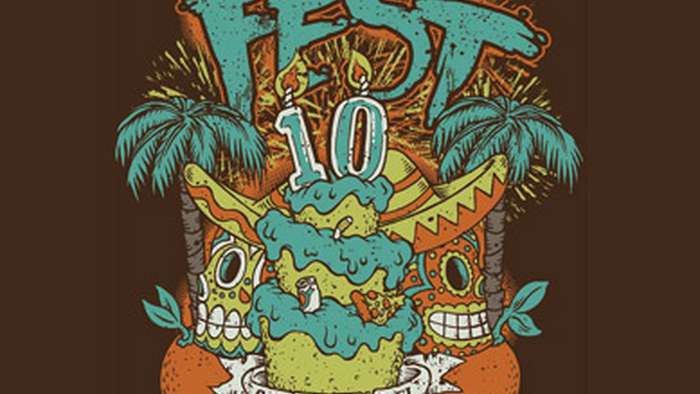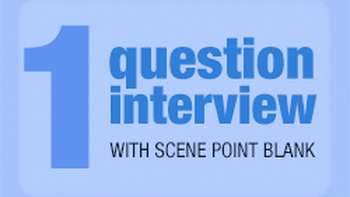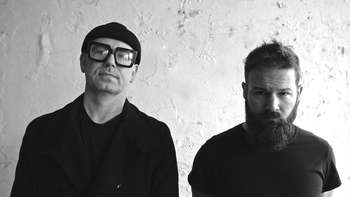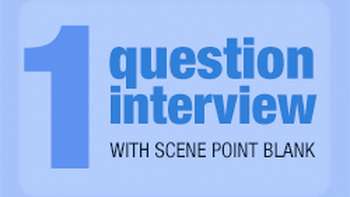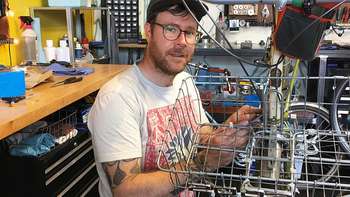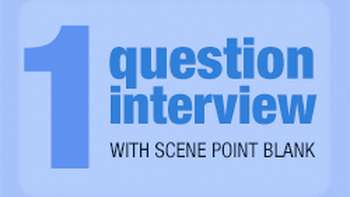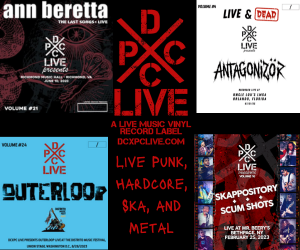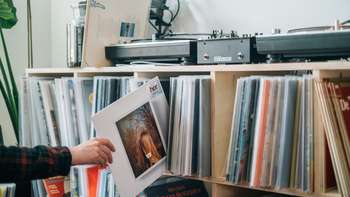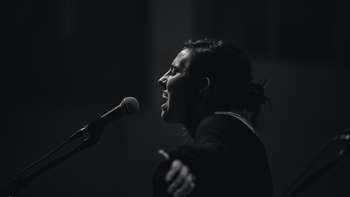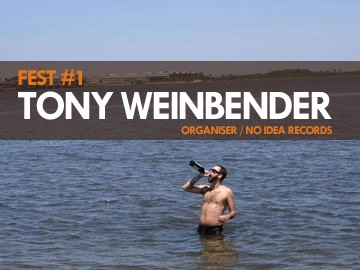
Scene Point Blank: What are some personal highlights of pulling off your first Fest?
Tony Weinbender: The highlight in doing it was that not many people k in town new who the fuck I was. Most of my friends I knew before moving here were in Less Than Jake or Hot Water Music and they were always on tour during those years.
I moved here in January 2000. Living here that first year, I got exposed to a lot of local bands I didn’t know about. There was a band called Argentina, Billy Reese Peters, Grabass Charlestons, the Beltones—I had no idea who the fuck the Beltones were. It was awesome, just finding out more about a scene that I thought I knew a lot about from being from out of town, but noting that there were a lot of other people as well. And I parlayed that with, “Okay, I know all these bands from Virginia” and, before then, I had worked for Fueled by Ramen so I knew some bands like Cadillac Blindside that that we invited down. Those are some of the highlights: pulling that together and then like, from knowing Cadillac Blindside I met Sean Tillman, who is Har Mar Superstar, and inviting him down. And back in the day I knew Murder City Devils and they were doing Pretty Girls Make Graves. So, kind of the highlight was just being, “Nobody knows who I am” and seeing if I could do it and get people into it.
It worked out and it was really hard in the very beginning. We didn’t do the ticketing. We tried to do advanced passes and nobody really bought them, so we had to scramble the week ahead to figure out how we were going to sell them. We had all these wristbands and they were selling them at the doors and that just turned into a clusterfuck because we had volunteers working at one of the main venues and they were just giving the wristbands away to their buddies. Later on, I ended up friends with the people that were volunteering and they actually confessed. “I really feel bad about that now, knowing you and shit.” Just the fact that it actually happened is a highlight. Nothing bad happened besides [the ticketing]. People had a good time and, after doing it, the vibe was so awesome and everybody was so excited about it that I jumped right into working on Fest 2.
Fest 1 happened in the spring time. I thought I’d do it over Spring Break thinking that people from other colleges would come down and hang out. It was basically, like, hardly anybody came from out of town. If they came from out of town it was still the state of Florida. We didn’t know how to advertise. We didn’t make posters. There wasn’t myspace then. There wasn’t a social network where you could get out to people. We just did what we did. It was small and it was awesome.
I wasn’t really really tight with Against Me! then—they were still a really young band—but I was blown away. I hadn’t seen a band play with that much energy and the crowd that mesmerized since I first saw Hot Water Music in 1994. Afterwards we were all chilling on this porch at this place called The Compound where a bunch of people lived and it looked like a goddamn compound and, anyway, there were a bunch of bands playing back there and I was just kind of reflecting, “Wow, we did two days of this and this was a lot of hard work.” My buddy Kyle and I were just sitting there and Tom [Gabel] came up to me, “Hey man, I’m Tom.” Thanks for doing this. This was really awesome, the vibe was amazing. If you ever want to do it again we’re totally down.” And he kind of sat with us and hung out. It was awesome. The vibe I wanted to kick out to this thing and this town really took off. I didn’t know Replay Dave [of Grabass Charlestons] at the time, and now he jokes around all the time, “Yeah dude, we just thought you were some fucking weirdo. We were like ‘we’ll play this thing but this guy’s gonna lose his ass.’”
And, I mean, I borrowed $2000—it was the only time I’ve ever borrowed money from my parents in my life, and I went to each of them separately and I borrowed $1000 from each of them because I was broke as shit. I worked at a fucking moving place. I had no loot at all and I was like, “Screw it, man. I’m going to try this out.” And so, Replay and them were like, “whatever” and I ended up losing $500 on it. I remember running to the ATM and trying to take money out and running to a door and seeing if there was any money and running back to the ATM and putting it in there. It was hectic and shit and it was hard but the fact was that everybody was into it and the vibe was good.
I look back on it from the perspective that, now, I’m 35 and we made it ten years. If you put money on it, I would have put money against myself. There’s no way I thought that I was going to be doing this or that people would care, or that ten years later there would be bands that I was interested in booking. But there’s so many new bands, so many awesome things and ten years later we’re able to bring back a bunch of old bands that hadn’t played in years. This year everybody justgot it. Everybody, for the most part, realized that this is an important thing. This is part of history and it’s part of their history. A lot of bands look back at their performances at Fest and it’s like a big turning point in their careers because they came down here, they got to really see what it’s like to play for people from all over. Now there are all these festivals where bands get the opportunity to do it but, back then, there wasn’t. You played CMJ or South by Southwest if you were lucky. We were doing Fest. Best Friends Day was just starting up and that was just some Richmond bands playing at a lake park. Krazyfest was dying out. There wasn’t much, man.
What we’ve done has helped a lot of people. It’s not really a corporate bullshit thing, we’re doing it because we really like music. I don’t make dick for putting this thing on.
Scene Point Blank: You answered quite a few of my questions in there, actually. When did No idea officially get involved with The Fest? It sounds like you weren’t working for them at the time of #1.
Tony Weinbender: I’ve known Var for a long time. He’s one of the reasons I felt comfortable moving to Gainesville. The first time I was down here was in ’94. I was doing a distro, a lot of bands were back then, that’s how I met Var. I can’t remember if it was Fest 2 or Fest 3—I just went to Var…I think he got more involved when I started working there maybe because it was one of those things like, “Okay, I’ll give you the sponsorship if I can use your postage meter. It might have been Fest 2. I can’t remember, but I definitely started working there around Fest 3 and ever since then they’ve been involved. As far as their involvement goes it’s kind of like, when I was working hourly it was, “Well Tony’s kind of working No Idea hours but like 3 hours a day he’s doing Fest stuff so we’ll just not press at it.” Laughs. One of those things. But all the guys there help. When they’re doing the mailorders they send stuff out, everybody plays in all the bands and that was a big part of it too. But, as far as organizing and stuff like that goes, nobody really does much there. In the early years a lot of the guys like Replay Dave and Matt Sweeting would volunteer to stage manage. Now, it’s mainly just a volunteer staff that’s a lot of new people and a lot of old people that have been doing it for years.
Scene Point Blank: How many venues were involved with #1?
Tony Weinbender: We had Market Street Pub, that was our main venue, and the old Common Grounds. We had a place called Purple Porpoise which is now called Gator City—it was more on the University side of town. They had a big room, they were doing shows at the time and then we quickly realized after, I think, Fest 2 that nobody wanted to walk the extra two blocks to go to this venue. It was actually kind of a nice size venue. We always used this place called the Future House—it was called the Future House because those dudes were the first house to wire their whole house with internet. Not wireless—the whole house was wired—and they were always doing these internet scams. The first couple years of Fest they did all our printing, like when we made the guidebook we had it Xeroxed. I don’t even think we had a guidebook the first couple years. We had a map and it had some band descriptions and some intro.
Scene Point Blank: And the first year it was a lot more locals, so there was probably less of a need for one?
Tony Weinbender: Yeah. After the first year a lot more people from, like, Georgia came down, more Virginia people started coming. Fest 2 or Fest 3—I can’t remember which one—we had our first overseas person. A guy named Henrick, we eventually called him Henni, came over from Germany, and Henni still comes to visit and is a really good friend. One of his best friends, Bjorn, came to Fest with him the following year after he came the first time. Bjorn has since met a girl from Gainesville, she moved to Germany with him, he finished school and now they both moved here and bought a house in Gainesville. So Fest makes love connections too. International love connections.
I asked him, “Henni, how did you know?” I think he came to Fest 3.
“I saw it on the No Idea site. Mainly because I wanted to see Small Brown Bike.” And Small Brown Bike actually broke up on the way down to Fest…Fest 2 or Fest 3, it was one of those. I lost track of the question somewhere.
Scene Point Blank: It was about venues.
Tony Weinbender: Oh, venues. For 2 years we used Wayward. Wayward is where we did Registration, maybe The Atlantic was around. I honestly can’t remember.
Scene Point Blank: When you initially did it, did you have the idea of using multiple venues across town? I’ve been to some festivals where it’s all in one venue all day long.
Tony Weinbender: I’ve always wanted to do multiple venues. That’s what we did in Virginia. We used every possible space we could in town. We didn’t have real, official venues back then. We had a ballroom on campus and a little theater with seating and we used this little restaurant, things like that. I like the multiple venue aspect and I like attending festivals with multiple venues.
I just got back from attending Chaos in Tejas, and I like that because you get a walking tour of the town, and also I like to choose my own adventure. I don’t want to be stuck in a venue: some band’s playing and I can’t leave. I don’t want to watch this band and I have no alternative to watch another band, you know? Insubordination Fest was the last fest like that I went to, and it was all in one fucking venue for a couple of days. It was 2 days in the city of Baltimore, yet all I get to see is a shithole venue and get raped on beer prices and raped on water prices. And it’s not their fault—maybe that’s all they have to deal with. But after that I was like, “I’m never fucking going back. They can have my favorite bands in the world play and I’m never going back because I don’t want to do that.”
And I think that one of the real appeals of Fest is that Gainesville is a small, cool Florida town. It’s a college town. There are a lot of good restaurants. The venues, for the most part, are really good. We don’t have a lot of venues compared to, like, Austin, Texas where I was just at, but everybody here is pretty much friendly. The weather’s perfect in the fall and you can just walk around town and hang out. A lot of times, because it happens around World Series time, you’ll be walking from one venue to another and look in, like, a little Irish pub and and it’s just full of dudes from bands and other people from out of town taking a break for a couple of hours and getting some beers, maybe some grub, and watching some sports. The non-Fest places are very, very accepting and want Festers to come in and hang out and be a part of it. That’s something that’s really grown over the last ten years: how accepting the non-punk establishments have been of all of us.
Scene Point Blank: That was going to be my next question: How accomodating the city has been?
Tony Weinbender: We purposely do Fest during the Georgia-Florida weekend which is where the University of Florida goes and plays the University of Georgia football team and they play in the neutral zone of Jacksonville, FL , which is an hour-and-a-half east of Gainesville. So all the college kids leave and, the decade before—moreso in the last five years—these local businesses that normally would be doing nothing that weekend are getting slammed. The falafel place is slammed; Mother’s Pub is slammed; the hotels are all filled up. Everyone is getting a little piece of the pie, to quote the Arrivals.
What hasn’t happened in the last ten years, and this has surprised me and a lot of people, is that the actual city government and the tourism board have not done anything whatsoever to help us. Even with the closing of Common Grounds—I had all these bands booked: I have 46 bands scheduled to play Common Grounds over three days and I’m pleading to the city and the tourism board because that’s their role. I’m bringing tourism into the town, generating tourism dollars, generating that tax for the city, and all I’m asking them is, “Hey can you put me in touch with the right people that I need to talk to. Can we maybe take over a parking lot and do an outside thing? Is there anybody who is sitting on a warehouse or something that hasn’t been able to rent it in 2 years so we can maybe rent it for just that weekend? Can we talk to the fire marshal?” Then, nothing. No love at all. They’re like, “We’ll look into it.” That’s how it is in most cities, but especially this city the government here is just…you’re not going to talk to anybody here. It’s baffling, but the overall acceptance of the city has been good.
We had our little flack a couple years ago where some kids threw a house party and a bunch of people came. It was late at night and people were out in the street because there were too many people. There was no sense even having this house party…all that stuff went down with the cops and the cops were cool about it to us. We got some bad flack in the local paper but the local paper is a piece of shit and will misquote everything and get the facts wrong constantly.
Scene Point Blank: There are 200-250 bands a year now. What is the selection process like? A lot are alumni or whatever you want to call it. Do you personally listen to every band, or is there a committee?
Tony Weinbender: We’ve never done committee. We used to do committees when I went to college in Harrisonburg. You waste so much time. I understand if you’re in a college environment, but I’m putting the money up, I’m doing this. I’m making the choices and I’ve always done that.
This is the first year we didn’t do applications and the only reason why is that, last year, I received 366-some odd applications. You find a lot of awesome application bands in the process. Some of the bands that we have now that play Fest year after year came from our application pool: Cheap Girls, The Ergs!, Lemuria, Bomb the Music Industry—I actually denied Bomb the Music Industry the first year. A lot of it is bands that I’ve seen throughout the years that I like, and now bands recommend other bands. Then, I’ve found a lot of bands just researching on the internet. I’m always looking for new bands just like listening to punknews. “We got a new stream from blahblahblah,” and I’ll always listen to them. If I like it, I have a spreadsheet like “Band Ideas for Fest.” And there’s the bands I always try to get into Fest and it just doesn’t work out because of either money or scheduling. We try to keep it, I would say, 250+ now, but we’ve jumped into the mid-300s before and then, last year, I think was in the 270-290 range.
So this year I booked up, then the Common Grounds thing happened so I just stopped booking and, luckily—for the first year ever—I started scheduling as I was booking. When I booked a band and confirmed them, I actually put them at Fest like “What day are you available?” And since it was so far in advance, the majority are like “every day” and then I just put them directly into the schedule. And then Rumrunners, a venue that we used, put a “For Lease” sign up in their window and I had that place booked up.
The only way I could pull this all off is we added two other venues. We added Durty Nelly’s, which we used to use, and we added a new place called The Laboratory who’s been doing shows all year. They do more…it’s definitely electronic, but it’s more sci-fi…It’s a nerd bar, basically. They do sandwiches and they have bands play and weird shit. Emotron totally fits in there. Man…or Astroman? would fit in there and they have even weirder performance art. They’re like “You can do whatever the fuck you want throughout The Fest.” They’re just stoked to be involved because they love music and they also know that people will spend money and drink. So that covered Rumrunners’ ass and then I extended the schedule completely so now, without Common Grounds and Rumrunners, every venue is running all day long. That’s going to put a toll on the attendees but, as far as that goes, attendees were already getting up early and going to shows anyway—just normally we had it to where only one or two venues started that early.
Scene Point Blank: Common Grounds and Rumrunners this year and Market Street the year before—Is this an annual situation you find yourself in?
Tony Weinbender: It’s pretty much that. Summertime comes around in Gainesville and all the businesses struggle because the college kids leave. Some people save their money and outlast summer and do certain things that make their businesses last throughout, and some people don’t and they find themselves hurting. Word yesterday is that somebody has taken over the lease at Common Grounds so, starting mid-July, Common Grounds will continue as a music venue. I’m meeting with them next week and they want to be in Fest so, unless this meeting goes drastically horrible or they try to charge me more money than they have in the past we will have Common Grounds back and I’ll have to re-work the entire schedule again. Laughs.
Scene Point Blank: And then you have to hope they’ll keep the business running from July into November.
Tony Weinbender: I know, I know. From what I’m gathering, they’re pretty much the same staff as Common Grounds, it’s just going to be a new operation and they’ll change the name. I think they’ll be okay. I hope this meeting goes okay.
Between Common Grounds’ closing and now, I had already come up with a backup plan and the people that own The Atlantic and The Top have a big space in that strip there—it used to be an old Woolsworth building and then it was a furniture storage place, and basically they have this giant warehouse space that they use. It looks like a big warehouse inside, but it’s a big building. It’s about the size of 8 Seconds without the balcony and they just hold a Christmas party in there once a year and we all go in there and drink free booze and dance and dress up and stuff. They are trying to talk to the city and the fire marshal and maybe get a temporary license for the weekend. So, if that happens, it’s going to take a lot of work because we’ll have to build a stage and rent sound, but we ran our own sound for The Venue, for 8 Seconds, we pretty much run these venues anyway. So if this happens and Common Grounds happens, we’ll go from not having enough venues to having more than we’ve ever had and it’ll be amazing because, right now, I’m in a situation where I never thought I would be. Selling out a festival in less than 30 days. It’s insane. I don’t know what we did right.
Scene Point Blank: 30 days?
Tony Weinbender: We put tickets on sale May 3rd and they sold out on June 2nd. It’s nuts. I set the number that was going to sell before Common Grounds and Rumrunners said they weren’t going to be involved, so that’s really the max I can sell because I have to take into account the press passes, volunteers, all the bands that are going to be here that are going to take weekend passes. It all adds up to a little over 5000 and we can be dicks and sell a shitload of passes and then nobody can get into any of the venues—we can be a South by Southwest or a CMJ and I don’t want to do that.
I’m really hoping we get these venues because, if we do, it will really spread out the schedule a lot more. [It will] give everybody a bit more breathing room; bands can play a little longer; and we can do this plan where a lot of the bands that had bumped up to Common Grounds or 8 Seconds or The Venue over the last couple years really wanted to go back to a place like 1982 and The Atlantic and play secret shows this year. That’s something that I had originally put in the schedule but, when these places closed down, I had to take all that shit out. So, now, if these venues come back, we can hopefully spread our wings and have all these weird, little secret things that aren’t announced until the day of. Nobody knows, not even the venue, and then, day of, there will be like, “Hey, internet, this band is playing at 1982 at 3 o’clock today.” Nobody massive. It’s not going to be Hot Water Music or Against Me! or Less Than Jake or anything, but it’s a lot of bigger bands. I can’t say who yet, but I’m really excited that these bands were stoked on the idea when I asked them, and that they’re cool enough to be like, “Hey, I understand why we can’t do it now.” You’re getting the first scoop, dude. And now it might not even happen. Laughs.
Scene Point Blank: Since we keep reminiscing and getting off topic, I only have one more “official” question. I was trying to keep this somewhat short, but… Do you have anything to say about the annual “this is the last year” rumors?
Tony Weinbender: There was only one real year where I was like, “Fuck it, this is the last year.” Fest 7 was really hard on me and it’s hard for me to remember what the exact reason was, but afterward, I think it was the year that Fest had gotten really big as far as Gainesville goes and people around town were talking shit like, “I gotta work all weekend because there are shows at my place,” or “I gotta work all weekend because my restaurant is too busy.” And then, you know, everybody was just being babies, pretty much across the board. I was like, “Nobody appreciates this. Fuck all you guys. 8 will be the last one.” Then we did 8 and 8 was great. Fest 8 ran smoother than any other festival we’d ever run: our crew of volunteers kicked ass and all the bands were super stoked. That was the year we got a new generation of young bloods who came up like. They were application bands the year before and this year is was like, boom!, explosion. They were all stoked and it made me feel, this is something I should keep doing. Why would I kill this off when it’s such a good vibe?
I never said 10 would be the last year. I will keep doing this as long as I feel like it’s not too much of a pain in the ass. This year I started it right away. Fest ended in October, November happened, I went to Thanksgiving and I started making my list. I was like, “For 10 I’m going to do alumni,” so I knew I had to talk to bands way early because Against Me!, Hot Water Music, Less Than Jake need to know way in advance. Talking Lifetime into doing shit again. Bouncing Souls had already confirmed. They were the first band to confirm because they couldn’t do it last year. At the point they realized they couldn’t do it, they were like, “We want next year.”
That’s another amazing thing. Bands that I kinda know like Souls, Lifetime. Bands that, the first year, it was a struggle to talk them into doing it. We don’t have big, huge corporate sponsors, we don’t have a lot of money and we also have a town that—as much as they say they support The Fest—we have to pay all these venues to do Fest there and they take 100%. It’s hard, but the cool thing is that the struggle happened years ago and, now, the bands are like, “Shit, this is fun. I’m playing to all my friends, people are going nuts. I’m pretty much on vacation.” Now they want to do it. It’s good to know that bands look forward to this just as much as attendees and they write this into their schedule for the year. It’s not that every band gets to play, but I’m going to be greedy. I’m going to pick bands that I’m close with and I’m going to pick bands that I really really like their music too. It’s hard. I feel like I’ve bummed a lot of bands out, but you can’t please everybody. If you try to…that’s one thing I’ve learned. You can’t please everybody.
